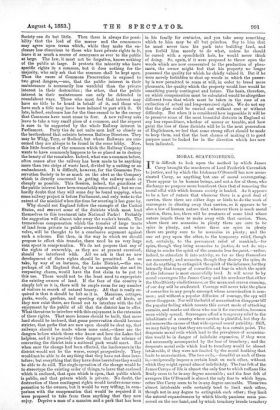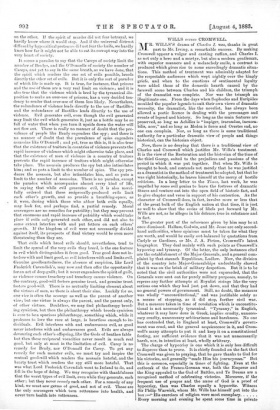MORAL SC.AVENGERINo.
IT is difficult to look upon the method by which James Carey brought the murderers of Lord Frederick Cavendish to justice, and by which the Irishman O'Donnell has now assas- sinated Carey, as anything but one of moral scavengering. There appear to be human beings, and not a few of them, who discharge no purpose more beneficent than that of removing the moral offal with which human society is loaded. As it appears to be a law of nature that wherever there is a good deal of carrion, there there are either dogs or birds to do the work of scavengers in clearing away that carrion, so it appears to be also a law of human nature that wherever there is much moral carrion, there, too, there will be creatures of some kind whose nature impels them to make away with that carrion. Thus, where there are assassins in plenty there are sure to be spies in plenty, and where there are spies in plenty there are pretty sure to be assassins in plenty ; and the one set prey upon the other, to the temporary relief, though not, certainly, to the permanent relief of mankind,—for spies, though they bring assassins to justice, do not do any- thing to render the spirit of the assassin less frequent,—rather, indeed, to stimulate it into activity, so far as they themselves are concerned ; and assassins, though they destroy the spies, do not do anything to extinguish the spirit of the informer, for they intensify that temper of cowardice and fear in which the spirit of the informer is most successfully bred. It will never be by moral scavengers like James Carey and his murderer that either the bloodthirsty vindictiveness, or the mean and craven canning, of onr day will be eradicated. Courage will never take the place of cowardice in any people amongst whom assassination is com- mon ; and without a popular diffusion of courage, the spy will never disappear. Nor will the habit of assassination disappear till the popular feeling which resents this covert mode of attacking enemies, and marks out those who use it for execration, becomes more widely spread. Scavengers afford a temporary relief to the inhabitants of a country where carrion is plentiful, but they do not remove the causes of that wide-spread moral putridity. Still, we may fairly say that they are useful, up to a certain point. The desperate moral evils which lead to the prevalence of assassina- tion would be in danger of indefinite expansion, if they were not necessarily accompanied by the fear of treachery ; and the desperate moral evils which lead to treachery would be almost intolerable, if they were not limited by the moral loathing that leads to assassination. The two evils,—dreadful as each of them is,—reciprocally impose a certain limit on each other, without which they might spread almost indefinitely. The fear felt of the James Careys of life is almost the only fear to which ruffians like Brady seem to be in any degree amenable ; and the fear felt of avengers like O'Donnell is almost the only fear to which hypo. crites like Carey seem to be in any degree amenable. These two almost intolerable evils certainly tend to limit each other, though not in any degree to extinguish each other; they limit the natural expansiveness by which bloody passions seem pos- sessed on the one hand, and by which treachery breeds treachery
on the other. If the spirit of murder did not fear betrayal, we hardly know where it would stop. And if the universal distrust diffused by hypocritical pretences did not fear the knife, we hardly know how far it might not be able to eat its corrupt way into the very heart of society.
It seems a paradox to say that the Careys of society limit the number of Bralys, and the O'Donnells of society the number of Careys, and yet to say in the same breath, as we have done, that the spirit which renders the one set of evils possible, breeds directly the other set of evils. But it is only the sort of paradox of which life is made up. It is true, for instance, that prisons and the use of them are a very real limit on violence ; and it is also true that the violence which is bred by the tyrannical dis- position to make an over-use of prisons, has a very decided ten- dency to render that over-use of them less likely. Nevertheless, the redundance of violence leads directly to the use of Bastille:, and the redundance of Bastilles leads directly to the use of violence. Evil generates evil, even though the evil generated may limit the evil which generates it, just as a bottle may be so full of water that when you turn it upside down the water will not flow out. There is really no manner of doubt that the pre- valence of people like Brady engenders the spy ; and there is no manner of doubt that the prevalence of spies engenders assassins like O'Donnell ; and yet, true as this is, it is also true that the existence of traitors in countries of violence prevents the rapid increase of violence which might otherwise take place, and that the existence of men of violence in a country of traitors prevents the rapid increase of traitors which might otherwise take place. The assassin produces the spy but also intimidates him ; and so puts a limit to the number of spies. The spy pro- duces the assassin, but also intimidates him, and so puts a limit to the number of assassins. There is no paradox, except the paradox which accompanies almost every kind of life, in saying that while evil generates evil, it is also merci- fully ordered that these reciprocally-produced evils limit each other's growth, and so provide a breathing-space, as it were, during which those who abhor both evils equally, may look for, and perhaps find, a partial remedy. Moral scavengers are no remedies for putridity ; but they may prevent that enormous and rapid increase of putridity which would take place if evils only generated each other, and did not also to some extent interfere with and put fetters on each others' growth. If the kingdom of evil were not necessarily divided against itself, its prospects of final victory would be even more threatening than they are.
That evils which breed evils should, nevertheless, tend to limit the spread of the very evils they breed, is the one feature in evil which distinguishes it from good. True good does not in- terfere with and limit good, as evil interferes with and limits evil. Genuine goodheartedness, the absence of suspicion, like Lord Frederick Cavendish's, may now and then offer the opportunity for an act of deep guilt; but it never engenders the spirit of guilt, as violence causes treachery and treachery causes violence. On the contrary, good-will fosters genuine trust, and genuine trust fosters good-will. There is no mutually limiting element about the virtues of men, as there is about their sins. Luckily for us, one vice is often the scourge as well as the parent of another vice ; but one virtue is always the parent, and the parent only, of other virtues. Doubtless, we may find philanthropy breed- ing cynicism, but then the philanthropy which breeds cynicism is sure to be a spurious philanthropy, something which, while it professes to love the race at large, is heartless enough to in- dividuals. Evil interferes with and embarrasses evil, as good never interferes with and embarrasses good. Evils are always devouring each other's offspring, like the Gods of heathen fable but then these reciprocal veracities never result in much real good, but only at most in the limitation of evil. Carey is no remedy for Brady, nor O'Donnell for Carey. To get any remedy for such monster evils, we must try and inspire the mutual good-will which renders the assassin hateful, and the hearty trust which renders the spy still more hateful. That was what Lord Frederick Cavendish went to Ireland to do, and fell in the hope of doing. We may recognise with thankfulness that the worst types of evil limit, even while they generate, each other ; but they never remedy each other. For a remedy of any kind, we must sow germs of good, and not of evil. Those are the only scavengers which turn rottenness into health, and never turn health into rottenness.



































 Previous page
Previous page